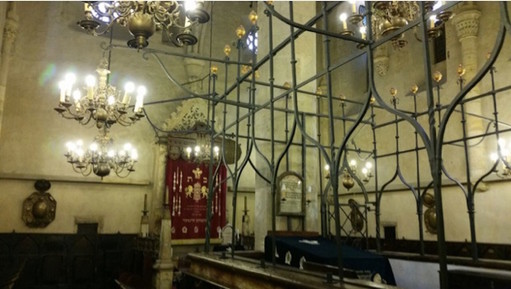Torah Columns
1861 results total, viewing 1231 - 1240
|
Many years ago, while teaching an adult education class, the topic we were studying was pushing someone’s buttons. We were discussing the underpinnings of the mitzvah of respect for one’s …
more
By Rabbi Binny Freedman
|
5/25/16
|
|
In its description of the Jubilee year, the Torah tell us in 25:9 that the shofar is to be sounded throughout the land on Yom Kippur of Yovel. Noting how we don’t blow shofar when Shabbos …
more
By Rabbi Avi Billet
|
5/25/16
|
|
Sefer Vayikra is the sole book in the Tanach in which the phrase “v’yarata m’elokecha” (“and you shall fear your G-d”) is found. It appears three times in Parashat …
more
By Rabbi David Etengoff
|
5/25/16
|
|
One of the most unusual textual juxtapositions in parasha Emor occurs at the onset of the Torah’s discussion of the mo’adim (festivals) (Vayikra, chapter 23): “And the L-rd spoke to …
more
By Rabbi David Etengoff
|
5/18/16
|
|
One of the more blatant ways in which the Torah indicates an anti-cruelty manner of behavior is in the rule of “oto v’et b’no” which creates an awareness that an animal and …
more
By Rabbi Avi Billet
|
5/18/16
|
|
On a visit to the synagogue of the Maharal of Prague (Rav Meir Leibush Lowe, known as the Altneu Shul), you will immediately notice its most distinctive feature: with the exception of some Hebrew …
more
By Rabbi Binny Freedman
|
5/18/16
|
|
Rabbi Chiya, in Midrash Vayikra Rabbah 24:5, teaches us that our parasha was taught to the entire nation (b’hakhal) “since the majority of the Torah’s fundamental principles may be …
more
By Rabbi David Etengoff
|
5/10/16
|
|
This week’s parsha contains a mitzvah that addresses the punishment to be placed upon those who curse their parents. This reference (Chapter 20 verse 9) seems to be a repeat from Shmot …
more
By Rabbi Avi Billet
|
5/10/16
|
|
The prohibition of imbibing blood is one of the well-known mitzvot found in our parasha (Vayikra 17:10-11). In it we find the unusual expression, v’natati panai, which is explained by both …
more
By Rabbi David Etengoff
|
5/4/16
|
|
G-d instructs Moshe to tell the people about the importance of observing His statutes and laws: “Keep My decrees and laws that a person can do — and live with them. For I am …
more
By Rabbi Avi Billet
|
5/4/16
|

 51.0°,
Overcast
51.0°,
Overcast 

